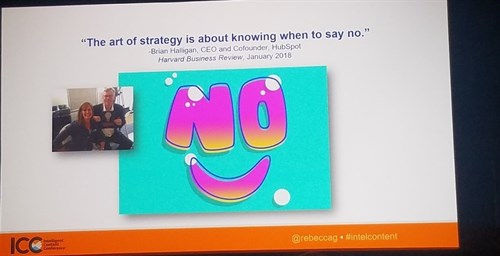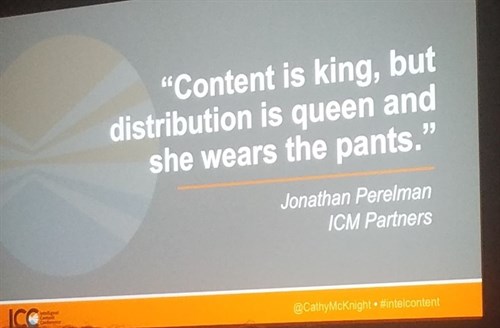Intelligent Content Conference 2018: Getting Serious About Putting Your Content to Work!
For the second year in a row the M Resort Spa & Casino hosted the Intelligent Content Conference (ICC) in Las Vegas, NV. As a first-time attendee of ICC I wasn’t quite sure what to expect. GPI has attended several content marketing-focused events over the years and I was curious to see how this one differentiated itself from the rest.
Well, ICC did not disappoint. According to Gartner, “in 2020, content will become marketing’s biggest bottleneck.” ICC’s sole focus was to give marketers the right tools to create and deploy a new kind of content strategy, less copy/paste mentality and more format-free and modular by providing a fresh perspective on delivering content exactly where, when and how audiences like it.
The conference was designed specifically for marketers and offered something for everyone, from the novice looking to get their feet wet to the content wizard seeking to further optimize their already slick content strategy.
Aside from great keynotes and general sessions by industry leaders such as Google, Amazon and Salesforce, this three-day event provided several conference tracks to choose from and each focused on a different aspect of content. I attended sessions in the Tools & Technology, Core Concepts, Advanced Planning and Content Collaboration tracks and had great take-aways from every single one of them.
A Few Highlights

Say No to Grow: How Narrowing Your Focus and Defining Personas Can Fuel Growth, Rebecca Geier, CEO and Co-Founder of TREW Marketing.
Rebecca took us on a path of conceptualizing one’s content strategy along the funnel by basing it on personas and understanding the importance of defining your core position and message. She made a compelling point for “scaling up by narrowing down” and focusing only on what it is we know and do best.
Her tips were:
- Say NO to Grow
- Think Customer First
- Go Deep!
Digital Standards for Complex Multi-Site, Multi-Language and Multi-Channel Digital Presences, Kristina Podnar, Digital Policy Advisor, NativeTrust Consulting, LLC.
This session made an excellent argument for the need for digital standards across all web, social or mobile platforms and channels for global organizations as they still often fall short of producing consistently high-quality content. Rather than seeing standards as a hinderance to creativity, organizations must recognize that in the absence of consistent enterprise-wide standards, companies risk putting out uneven content resulting in poor customer experiences. Statistics from a QualityZ Online Survey further underscored this argument:
- 76% of websites have inconsistent branding, unpredictable navigation, reinvention of content and multiple content platforms.
- 82% of global websites display inconsistent translation, lack of localization, uneven content prioritization and inaccessible information.

How to Create a Messaging Framework that Resonates, Pam Didner, Author of Global Content Marketing.
As was the case with Pam’s excellent workshop on setting up and managing a global, content-first marketing team where participants learned how to cover the five elements of content marketing (strategy, content plan, team, processes and budget) when creating their own plan, this session helped answer the two questions marketers are asked most often:
- How much budget do we have?
- How do we position our products and services?
Her step-by-step approach included dissecting a company’s content marketing efforts (i.e. product features vs. benefits, messaging vs. value propositions) and then creating a messaging framework by using simple, yet highly effective templates to organize and personalize content to address customers’ needs.
To that point, many organizations, even very large ones, still have a long way to go before mastering content. CMI’s 2018 Content Management/Strategy Research underscored that fact. Of all the companies that were part of this research study, mostly larger and global in nature, over 90% considered content a business asset, yet only 20% could be categorized as advanced or expert in the field. The biggest challenges that remain are talent, technology, governance and budget. All too often guilty of delivering “the right message at the wrong time” the key to understanding the meaning of relevance (what we want to say vs. what they are interested in) is to constantly measure customer behavior and perception, as well as internal assessment. As Cathy McKnight from Digital Clarity Group said: “measure twice, then act.”
